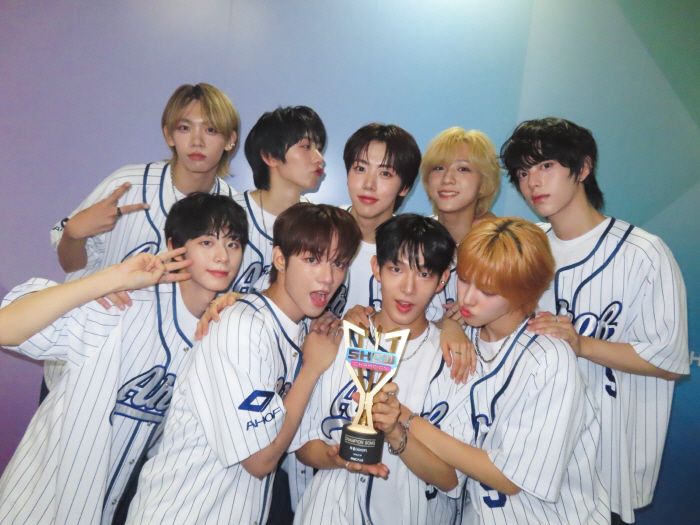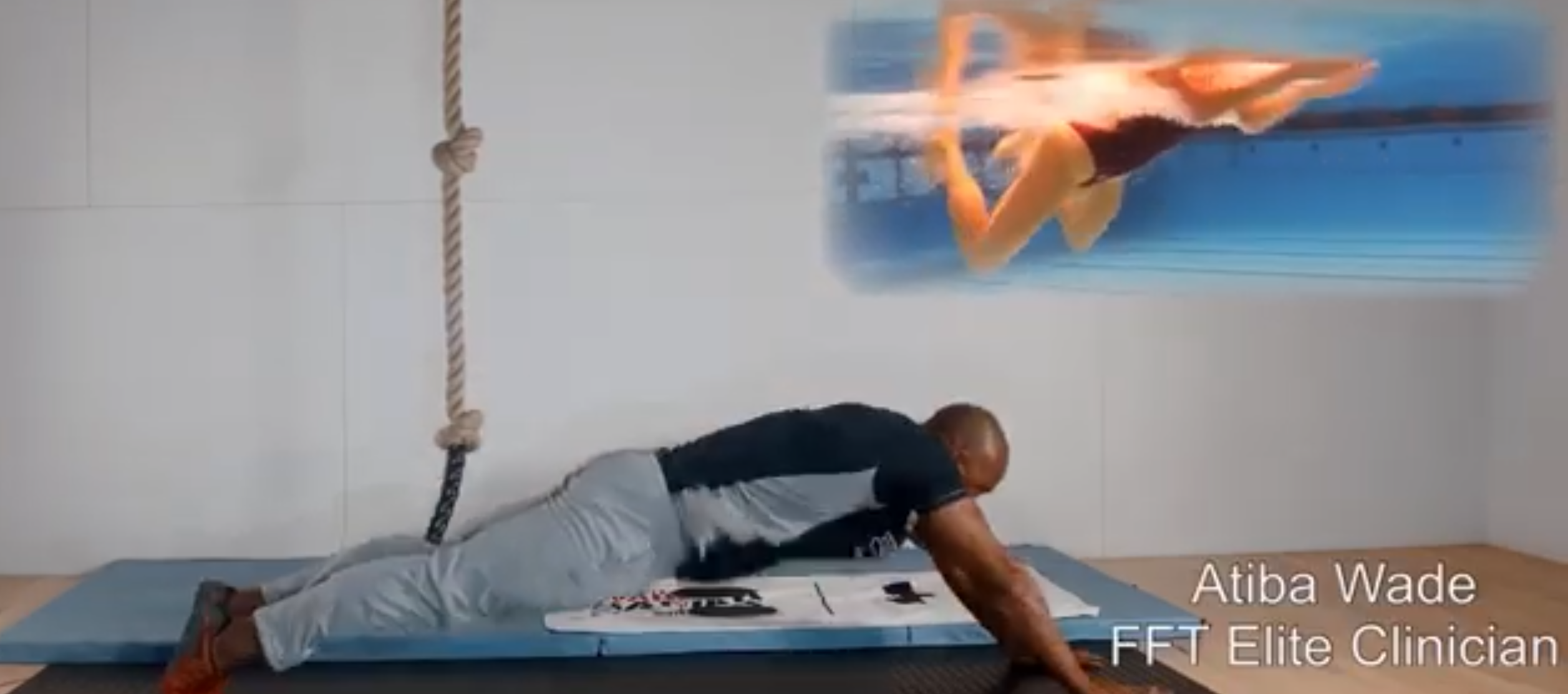 Dar es Salaam. In a pioneering effort that combined elite athletic expertise with community development, internationally recognized swim coach Atiba Wade, a former USA Olympic Trials qualifier and NCAA athlete, conducted an empowering session with the Monti International School community. The event brought together parents, teachers, and young swimmers in an inspiring discussion centered on goal-setting, developing a growth mindset, and emphasizing the crucial role of parental involvement in sports. The forum was organized by Champion Rise Tanzania, in partnership with Monti International School, RM, Colosseum Hotel & Fitness Club, and Shaaban Roberts School. It was part of a larger initiative to improve swimming standards in Tanzania and included the International ASCA Coaches Certification Program, sponsored by Monti International. This certification aligns Tanzanian coaches with global coaching standards and ensures the future of the sport is built on knowledge, discipline, and best practices worldwide. Mindset, mentorship, and the impact of parents Coach Atiba brought more than just his impressive background—he delivered a powerful message about unity, purpose, and belief in the potential of young athletes. The forum specifically explored how emotional and psychological factors influence a child's journey in competitive sports. According to Atiba, understanding these hidden elements can often determine whether a child experiences burnout or achieves success. “It’s not just about training hard,” he said. “It’s about training smart. When parents understand the mindset required for growth in sports, children feel more supported, confident, and motivated to push beyond their limits.” He explained that young athletes often face pressure and self-doubt, and a supportive home environment can significantly enhance their resilience, motivation, and performance. By involving parents in the development process, Atiba believes that sports becomes not only an individual pursuit but also a shared family value. A vision realized at Monti International The forum also marked a significant milestone in Monti International School’s journey. As a Cambridge-certified institution offering Pre-Primary and Primary education, Monti has gradually become a model for holistic child development in Tanzania. The school used this opportunity to announce its plans to build a 25-meter swimming pool at its Rose Garden Road campus, reinforcing its long-term commitment to creating world-class sports facilities. Additionally, through the ASCA program, Monti has invested in training its coaches and administrators, ensuring that its sports philosophy is not only aspirational but also technically and structurally aligned with international standards. “We are truly grateful to Amina Mfaume for making this vision a reality,” said Fatma Fernandes, Head of Monti International School. “Bringing someone of Coach Atiba’s caliber to Tanzania has been a game-changer for our community. At Monti, we nurture the whole child—mind, body, and spirit.” Hosting Coach Atiba alongside parents reflects Monti’s deep commitment not only to academic excellence but also to world-class sports development. Fernandes added that events like these symbolize Monti’s broader educational mission: to create an environment where every child is empowered to dream big, grow with confidence, and embrace both local culture and global opportunities. “This event exemplifies the forward-thinking mindset and global exposure we strive to provide every Monti child,” she continued. “We are proud to build a school where parents are partners, coaches are certified to the highest standards, and each student is encouraged to pursue excellence—on every front.” The Role of Champion Rise Tanzania At the core of this initiative is Champion Rise Tanzania, an organization founded by Amina Mfaume to bridge the gap between local talent and international opportunities. For Amina, bringing Coach Atiba to Tanzania wasn’t just about coaching—it was about belief. “My goal is to expose Tanzanian children and coaches to global excellence,” said Mfaume. “Bringing Coach Atiba here was about showing what’s possible when we invest in our children’s potential. This is about raising the bar, not just for sports, but for how we raise a generation of disciplined, driven, and empowered young people.” Champion Rise continues to work closely with schools, local clubs, and international partners to elevate sports education and access in Tanzania. The inclusion of parents in this forum was intentional, Amina said, because sustainable athletic success starts with family understanding and encouragement. Empowerment inside and outside the pool The forum’s impact was clear and deeply felt. Monti’s young swimmers learned not just about technique or performance—but about setting personal goals, building habits, and believing in their own ability to grow. Parents left the session with practical tools, mindset shifts, and a greater appreciation of the role they play in their child’s sporting journey. The experience became a shared moment of transformation—where the pool became more than water; it became a platform for dreams, discipline, and determination. As Monti International School continues to invest in both academic and extracurricular excellence, initiatives like this reaffirm its role as a leading institution committed to raising confident, well-rounded global citizens—one lap at a time. Provided by SyndiGate Media Inc.Syndigate.info).
Dar es Salaam. In a pioneering effort that combined elite athletic expertise with community development, internationally recognized swim coach Atiba Wade, a former USA Olympic Trials qualifier and NCAA athlete, conducted an empowering session with the Monti International School community. The event brought together parents, teachers, and young swimmers in an inspiring discussion centered on goal-setting, developing a growth mindset, and emphasizing the crucial role of parental involvement in sports. The forum was organized by Champion Rise Tanzania, in partnership with Monti International School, RM, Colosseum Hotel & Fitness Club, and Shaaban Roberts School. It was part of a larger initiative to improve swimming standards in Tanzania and included the International ASCA Coaches Certification Program, sponsored by Monti International. This certification aligns Tanzanian coaches with global coaching standards and ensures the future of the sport is built on knowledge, discipline, and best practices worldwide. Mindset, mentorship, and the impact of parents Coach Atiba brought more than just his impressive background—he delivered a powerful message about unity, purpose, and belief in the potential of young athletes. The forum specifically explored how emotional and psychological factors influence a child's journey in competitive sports. According to Atiba, understanding these hidden elements can often determine whether a child experiences burnout or achieves success. “It’s not just about training hard,” he said. “It’s about training smart. When parents understand the mindset required for growth in sports, children feel more supported, confident, and motivated to push beyond their limits.” He explained that young athletes often face pressure and self-doubt, and a supportive home environment can significantly enhance their resilience, motivation, and performance. By involving parents in the development process, Atiba believes that sports becomes not only an individual pursuit but also a shared family value. A vision realized at Monti International The forum also marked a significant milestone in Monti International School’s journey. As a Cambridge-certified institution offering Pre-Primary and Primary education, Monti has gradually become a model for holistic child development in Tanzania. The school used this opportunity to announce its plans to build a 25-meter swimming pool at its Rose Garden Road campus, reinforcing its long-term commitment to creating world-class sports facilities. Additionally, through the ASCA program, Monti has invested in training its coaches and administrators, ensuring that its sports philosophy is not only aspirational but also technically and structurally aligned with international standards. “We are truly grateful to Amina Mfaume for making this vision a reality,” said Fatma Fernandes, Head of Monti International School. “Bringing someone of Coach Atiba’s caliber to Tanzania has been a game-changer for our community. At Monti, we nurture the whole child—mind, body, and spirit.” Hosting Coach Atiba alongside parents reflects Monti’s deep commitment not only to academic excellence but also to world-class sports development. Fernandes added that events like these symbolize Monti’s broader educational mission: to create an environment where every child is empowered to dream big, grow with confidence, and embrace both local culture and global opportunities. “This event exemplifies the forward-thinking mindset and global exposure we strive to provide every Monti child,” she continued. “We are proud to build a school where parents are partners, coaches are certified to the highest standards, and each student is encouraged to pursue excellence—on every front.” The Role of Champion Rise Tanzania At the core of this initiative is Champion Rise Tanzania, an organization founded by Amina Mfaume to bridge the gap between local talent and international opportunities. For Amina, bringing Coach Atiba to Tanzania wasn’t just about coaching—it was about belief. “My goal is to expose Tanzanian children and coaches to global excellence,” said Mfaume. “Bringing Coach Atiba here was about showing what’s possible when we invest in our children’s potential. This is about raising the bar, not just for sports, but for how we raise a generation of disciplined, driven, and empowered young people.” Champion Rise continues to work closely with schools, local clubs, and international partners to elevate sports education and access in Tanzania. The inclusion of parents in this forum was intentional, Amina said, because sustainable athletic success starts with family understanding and encouragement. Empowerment inside and outside the pool The forum’s impact was clear and deeply felt. Monti’s young swimmers learned not just about technique or performance—but about setting personal goals, building habits, and believing in their own ability to grow. Parents left the session with practical tools, mindset shifts, and a greater appreciation of the role they play in their child’s sporting journey. The experience became a shared moment of transformation—where the pool became more than water; it became a platform for dreams, discipline, and determination. As Monti International School continues to invest in both academic and extracurricular excellence, initiatives like this reaffirm its role as a leading institution committed to raising confident, well-rounded global citizens—one lap at a time. Provided by SyndiGate Media Inc.Syndigate.info).DAILY NEWS
Latest hot news all day long.
Atiba Motivates Monti Parents and Swimmers at Sports Forum
 Dar es Salaam. In a pioneering effort that combined elite athletic expertise with community development, internationally recognized swim coach Atiba Wade, a former USA Olympic Trials qualifier and NCAA athlete, conducted an empowering session with the Monti International School community. The event brought together parents, teachers, and young swimmers in an inspiring discussion centered on goal-setting, developing a growth mindset, and emphasizing the crucial role of parental involvement in sports. The forum was organized by Champion Rise Tanzania, in partnership with Monti International School, RM, Colosseum Hotel & Fitness Club, and Shaaban Roberts School. It was part of a larger initiative to improve swimming standards in Tanzania and included the International ASCA Coaches Certification Program, sponsored by Monti International. This certification aligns Tanzanian coaches with global coaching standards and ensures the future of the sport is built on knowledge, discipline, and best practices worldwide. Mindset, mentorship, and the impact of parents Coach Atiba brought more than just his impressive background—he delivered a powerful message about unity, purpose, and belief in the potential of young athletes. The forum specifically explored how emotional and psychological factors influence a child's journey in competitive sports. According to Atiba, understanding these hidden elements can often determine whether a child experiences burnout or achieves success. “It’s not just about training hard,” he said. “It’s about training smart. When parents understand the mindset required for growth in sports, children feel more supported, confident, and motivated to push beyond their limits.” He explained that young athletes often face pressure and self-doubt, and a supportive home environment can significantly enhance their resilience, motivation, and performance. By involving parents in the development process, Atiba believes that sports becomes not only an individual pursuit but also a shared family value. A vision realized at Monti International The forum also marked a significant milestone in Monti International School’s journey. As a Cambridge-certified institution offering Pre-Primary and Primary education, Monti has gradually become a model for holistic child development in Tanzania. The school used this opportunity to announce its plans to build a 25-meter swimming pool at its Rose Garden Road campus, reinforcing its long-term commitment to creating world-class sports facilities. Additionally, through the ASCA program, Monti has invested in training its coaches and administrators, ensuring that its sports philosophy is not only aspirational but also technically and structurally aligned with international standards. “We are truly grateful to Amina Mfaume for making this vision a reality,” said Fatma Fernandes, Head of Monti International School. “Bringing someone of Coach Atiba’s caliber to Tanzania has been a game-changer for our community. At Monti, we nurture the whole child—mind, body, and spirit.” Hosting Coach Atiba alongside parents reflects Monti’s deep commitment not only to academic excellence but also to world-class sports development. Fernandes added that events like these symbolize Monti’s broader educational mission: to create an environment where every child is empowered to dream big, grow with confidence, and embrace both local culture and global opportunities. “This event exemplifies the forward-thinking mindset and global exposure we strive to provide every Monti child,” she continued. “We are proud to build a school where parents are partners, coaches are certified to the highest standards, and each student is encouraged to pursue excellence—on every front.” The Role of Champion Rise Tanzania At the core of this initiative is Champion Rise Tanzania, an organization founded by Amina Mfaume to bridge the gap between local talent and international opportunities. For Amina, bringing Coach Atiba to Tanzania wasn’t just about coaching—it was about belief. “My goal is to expose Tanzanian children and coaches to global excellence,” said Mfaume. “Bringing Coach Atiba here was about showing what’s possible when we invest in our children’s potential. This is about raising the bar, not just for sports, but for how we raise a generation of disciplined, driven, and empowered young people.” Champion Rise continues to work closely with schools, local clubs, and international partners to elevate sports education and access in Tanzania. The inclusion of parents in this forum was intentional, Amina said, because sustainable athletic success starts with family understanding and encouragement. Empowerment inside and outside the pool The forum’s impact was clear and deeply felt. Monti’s young swimmers learned not just about technique or performance—but about setting personal goals, building habits, and believing in their own ability to grow. Parents left the session with practical tools, mindset shifts, and a greater appreciation of the role they play in their child’s sporting journey. The experience became a shared moment of transformation—where the pool became more than water; it became a platform for dreams, discipline, and determination. As Monti International School continues to invest in both academic and extracurricular excellence, initiatives like this reaffirm its role as a leading institution committed to raising confident, well-rounded global citizens—one lap at a time. Provided by SyndiGate Media Inc.Syndigate.info).
Dar es Salaam. In a pioneering effort that combined elite athletic expertise with community development, internationally recognized swim coach Atiba Wade, a former USA Olympic Trials qualifier and NCAA athlete, conducted an empowering session with the Monti International School community. The event brought together parents, teachers, and young swimmers in an inspiring discussion centered on goal-setting, developing a growth mindset, and emphasizing the crucial role of parental involvement in sports. The forum was organized by Champion Rise Tanzania, in partnership with Monti International School, RM, Colosseum Hotel & Fitness Club, and Shaaban Roberts School. It was part of a larger initiative to improve swimming standards in Tanzania and included the International ASCA Coaches Certification Program, sponsored by Monti International. This certification aligns Tanzanian coaches with global coaching standards and ensures the future of the sport is built on knowledge, discipline, and best practices worldwide. Mindset, mentorship, and the impact of parents Coach Atiba brought more than just his impressive background—he delivered a powerful message about unity, purpose, and belief in the potential of young athletes. The forum specifically explored how emotional and psychological factors influence a child's journey in competitive sports. According to Atiba, understanding these hidden elements can often determine whether a child experiences burnout or achieves success. “It’s not just about training hard,” he said. “It’s about training smart. When parents understand the mindset required for growth in sports, children feel more supported, confident, and motivated to push beyond their limits.” He explained that young athletes often face pressure and self-doubt, and a supportive home environment can significantly enhance their resilience, motivation, and performance. By involving parents in the development process, Atiba believes that sports becomes not only an individual pursuit but also a shared family value. A vision realized at Monti International The forum also marked a significant milestone in Monti International School’s journey. As a Cambridge-certified institution offering Pre-Primary and Primary education, Monti has gradually become a model for holistic child development in Tanzania. The school used this opportunity to announce its plans to build a 25-meter swimming pool at its Rose Garden Road campus, reinforcing its long-term commitment to creating world-class sports facilities. Additionally, through the ASCA program, Monti has invested in training its coaches and administrators, ensuring that its sports philosophy is not only aspirational but also technically and structurally aligned with international standards. “We are truly grateful to Amina Mfaume for making this vision a reality,” said Fatma Fernandes, Head of Monti International School. “Bringing someone of Coach Atiba’s caliber to Tanzania has been a game-changer for our community. At Monti, we nurture the whole child—mind, body, and spirit.” Hosting Coach Atiba alongside parents reflects Monti’s deep commitment not only to academic excellence but also to world-class sports development. Fernandes added that events like these symbolize Monti’s broader educational mission: to create an environment where every child is empowered to dream big, grow with confidence, and embrace both local culture and global opportunities. “This event exemplifies the forward-thinking mindset and global exposure we strive to provide every Monti child,” she continued. “We are proud to build a school where parents are partners, coaches are certified to the highest standards, and each student is encouraged to pursue excellence—on every front.” The Role of Champion Rise Tanzania At the core of this initiative is Champion Rise Tanzania, an organization founded by Amina Mfaume to bridge the gap between local talent and international opportunities. For Amina, bringing Coach Atiba to Tanzania wasn’t just about coaching—it was about belief. “My goal is to expose Tanzanian children and coaches to global excellence,” said Mfaume. “Bringing Coach Atiba here was about showing what’s possible when we invest in our children’s potential. This is about raising the bar, not just for sports, but for how we raise a generation of disciplined, driven, and empowered young people.” Champion Rise continues to work closely with schools, local clubs, and international partners to elevate sports education and access in Tanzania. The inclusion of parents in this forum was intentional, Amina said, because sustainable athletic success starts with family understanding and encouragement. Empowerment inside and outside the pool The forum’s impact was clear and deeply felt. Monti’s young swimmers learned not just about technique or performance—but about setting personal goals, building habits, and believing in their own ability to grow. Parents left the session with practical tools, mindset shifts, and a greater appreciation of the role they play in their child’s sporting journey. The experience became a shared moment of transformation—where the pool became more than water; it became a platform for dreams, discipline, and determination. As Monti International School continues to invest in both academic and extracurricular excellence, initiatives like this reaffirm its role as a leading institution committed to raising confident, well-rounded global citizens—one lap at a time. Provided by SyndiGate Media Inc.Syndigate.info).Edtech Insights: Kwame Nyatuame on Coding in Schools and the Digital Economy
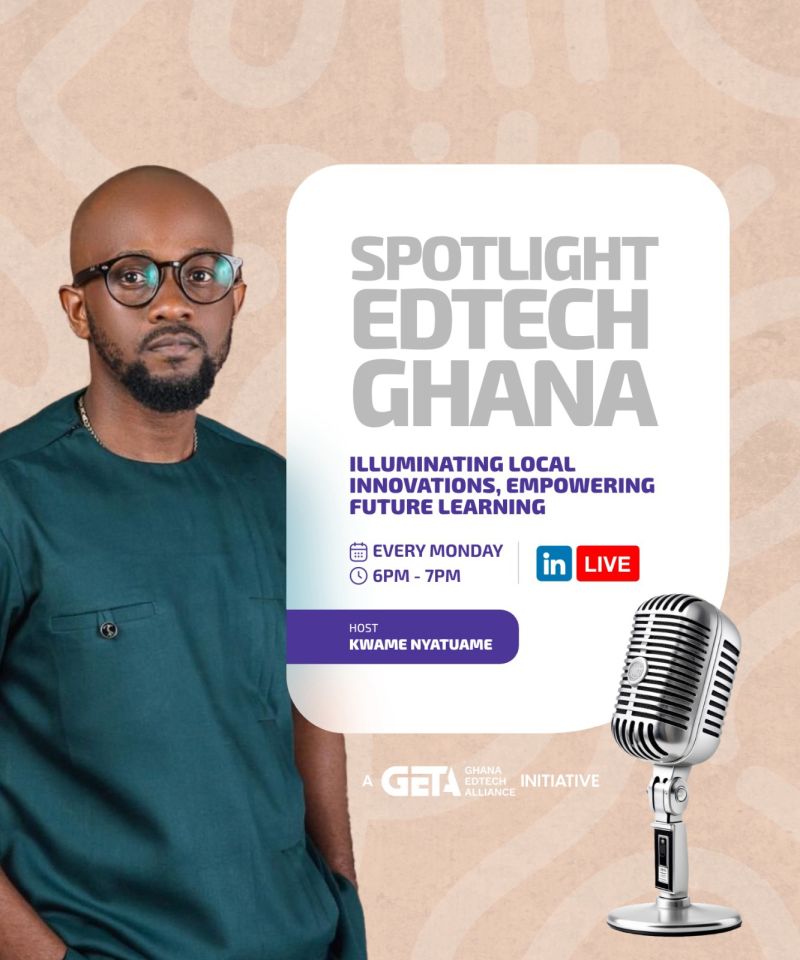
It's a Thursday morning at a modest public school in Ho. A group of JHS students gather eagerly around one laptop.
They aren't just having fun—they're creating basic code that causes a cat to move on the screen using Scratch, a graphical programming platform designed for newcomers. The laughter is noticeable, but even more prominent is the sound of the future resonating within that small classroom.
That's the significance of incorporating coding education in schools—it goes beyond merely producing software engineers. It's about equipping young individuals to comprehend, influence, and succeed in a digital-first economy that is already present. In this piece, we examine what coding in schools truly signifies for Ghana's growth, why it has become more crucial than ever, and how we can implement it effectively.
Why coding? Why now?
Coding is frequently referred to as the "literacy of the future." However, let's examine it closely. Similar to how learning to read enables us to comprehend our surroundings, learning to code empowers us to build and shape the digital world. We reside in a society driven by technology.
From the applications used to order meals, to the systems that handle banking, elections, and our medical records, software is quietly controlling everything. Those who can comprehend and develop this software are not just employees—they are designers of tomorrow. Therefore, when we educate children on programming, we are doing more than just filling their minds with code. We are helping them learn to think in a structured way, tackle challenges, and come up with solutions for themselves and their neighborhoods.
The rising enthusiasm for programming in Ghana
It's true that Ghana is beginning to recognize this situation. In 2019, the Ministry of Education launched the Coding for Kids initiative, teaching fundamental programming abilities in certain public schools. By 2024, more than 250 primary schools in the Greater Accra and Ashanti regions have incorporated coding into their ICT syllabus—with intentions to extend it nationwide.
Several prominent Ghanaian Edtech projects in this area are:
- Ghana Code Club –Established by Ernestina Appiah, this non-profit organization has exposed more than 20,000 children to programming through engaging, interactive approaches such as Scratch and Python.
- Soronko Academy –The first coding and human-centered design institution for girls in Africa, established by Regina Honu. Soronko has equipped thousands of girls from marginalized communities with coding skills and the ambition to achieve great things.
- Young and Heart Ghana –Via their Learning Lions initiative, they employ storytelling and game-based technological education to introduce children to digital abilities, such as fundamental programming concepts.
These efforts go beyond instructing in programming—they are transforming people's lives.
The African setting – A significant chance, an even greater duty
Throughout the continent, significant efforts are being made. Rwanda introduced coding as a required subject in schools in 2019. South Africa implemented a comprehensive coding curriculum for Grades R–9 in 2023. Kenya and Nigeria have put substantial resources into training teachers for digital skills education. According to a World Economic Forum report (2023), Africa's digital economy could reach US$712 billion by 2050—but only if we develop a workforce skilled in digital technologies. In Ghana, the Ghana Statistical Service and UNICEF note that fewer than 30 percent of basic school teachers feel confident incorporating digital tools into their teaching. This is a gap that needs to be addressed urgently.
The actual impact of programming on national development
Let’s bring this home.
Programming goes beyond creating applications. It's about developing mindsets—those essential for crafting a Ghana that we can all be proud of:
- Young individuals equipped with the skills to leverage technology for addressing challenges within their local areas.
- Skilled individuals capable of securing positions within Ghana's technology sector—or launching their own ventures.
- Bold visionaries who don't merely use technology but develop it.
- Innovators who create with compassion, keeping their community at heart.
- Patriotic individuals who recognize that Ghana's future will be shaped not through assistance, but through innovative thoughts.
Picture young individuals developing waste management solutions through IoT, farmers utilizing AI-driven applications crafted by local programmers, or students designing platforms to aid learning in their mother tongues. This is the Ghana we need to code into reality.
But… Are we ready?
Certainly, there are difficulties.
- Infrastructure: Numerous rural schools do not have access to computers or consistent power, let alone Wi-Fi.
- Teacher Development: Many educators find programming challenging. Without adequate instruction, implementation may face delays.
- Educational Structure: The present learning system continues to emphasize memorization, rather than fostering innovative thinking.
However, none of these difficulties are impossible to overcome. Through targeted investments, effective collaborations, and strong political commitment, Ghana has the potential to serve as an example of inclusive, technology-based education across Africa.
What steps can be taken?
- National programming curriculum – Ghana should officially integrate coding at the primary school level and develop a structured, culturally appropriate program.
- Support professional development for teachers – Provide our education professionals not only with technology, but also with self-assurance. A teacher proficient in digital skills plays a key role in shaping a country's future.
- Back local Edtech ventures – indigenous platforms have the deepest understanding of the Ghanaian environment. Let's invest in and expand them.
- Make programming enjoyable and relevant – Employ narratives, game elements, and practical projects that resonate with students' experiences – such as developing an app to report broken water wells or monitor market costs.
- Focus on girls and marginalized groups – fairness should be the core principle. Digital skills should not turn into a means that increases social inequalities.
Last reflections – Beyond a talent, a super ability
Frequently, we discuss the importance of expanding Ghana's economy beyond gold and cocoa. However, the most significant asset we possess is not found in the ground. It resides within the minds of our students. If we can educate them to code—encourage critical thinking, construction, learning from failure, perseverance, and innovation—we are not merely imparting a professional skill. We are bestowing upon them a remarkable ability.
A capability to envision. To address challenges. To create. And above all, to dream and bring forth a more improved, courageous Ghana. Let's incorporate this into our nation's narrative—one line of code at a time.
>>>Next in the Series: ‘Working Beyond Borders – How Pan-African Edtech Collaborations Can Create Wide-Ranging Effects’
Sources:
- World Economic Forum Africa Digital Economy Report (2023)
- Ghana Statistical Service and UNICEF Ghana Digital Skills Report (2024)
- Kids' Coding Pilot Program Report – Ministry of Education, Ghana
- Soronko Academy Annual Impact Report (2023)
- Ghana Code Club Data (2023)
>>>the author is an edtech enthusiast, writer, and president of the ghana edtech alliance. he is dedicated to leveraging storytelling to highlight the impact of educational technology in changing lives throughout africa. he can be contacted throughghanaedtechalliance@gmail.com
Provided by SyndiGate Media Inc. (Syndigate.info).How to Choose the Perfect International School for Your Child
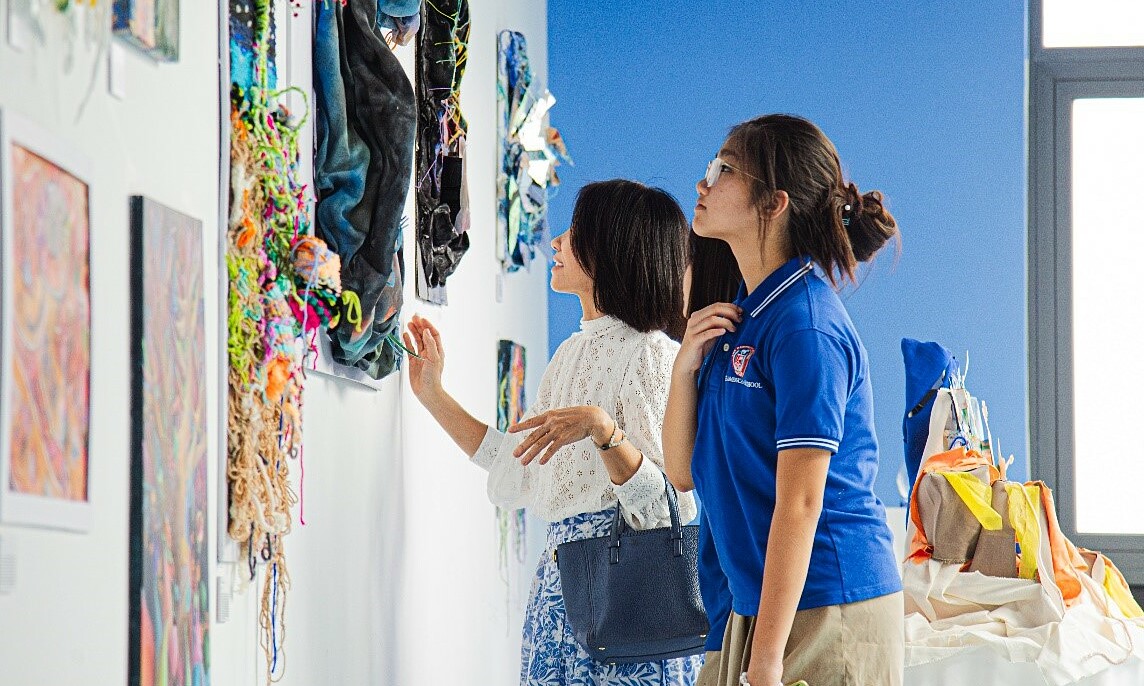
Choosing the right international school involves more than just evaluating the curriculum; it means finding a nurturing environment, a future-focused academic path, and a supportive community that will shape your child's character and intellect.
At The American School (TAS), a U.S.-accredited international school located in An Phu, Ho Chi Minh City, students are empowered with the confidence and skills to succeed globally, while enjoying a well-rounded school experience that balances learning and play.
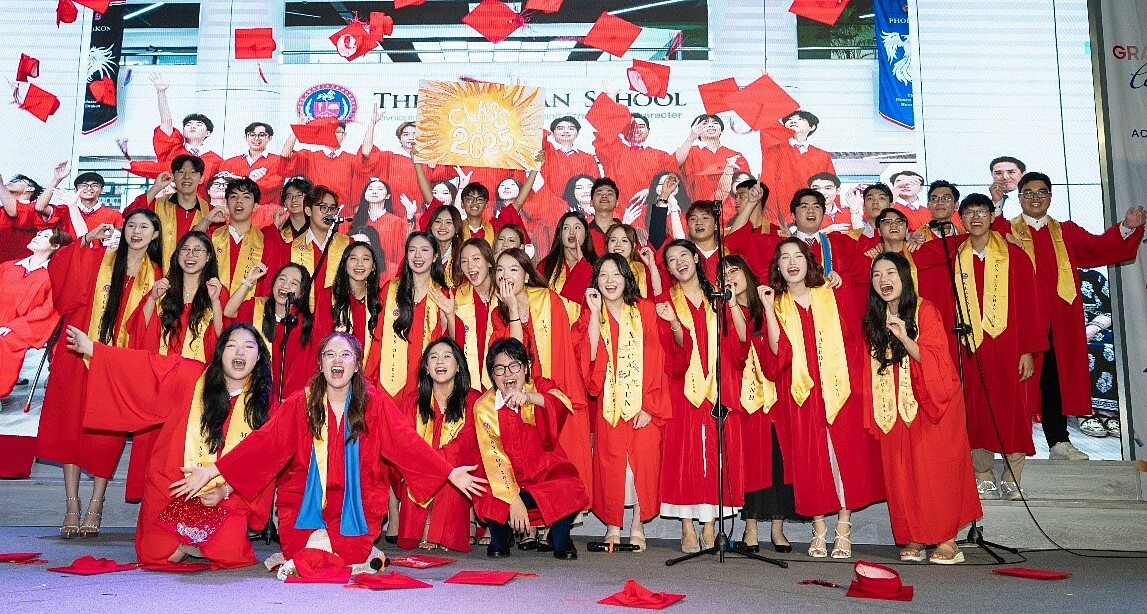
|
|
Students on graduation day. Photo courtesy of TAS |
A strong academic foundation
One of the top priorities for parents selecting an international school is ensuring high-quality education and well-rounded development for their child. In the 2024–2025 academic year alone, TAS Grade 12 students secured over 30 scholarships worth more than US$2 million from prestigious universities, including UC Berkeley, UC Davis, the University of Toronto, Monash University, the University of Melbourne, RMIT, MICA, and Frankfurt School of Finance and Management.
These impressive achievements stem from TAS's personalized American-standard curriculum, long-term academic planning, experienced international faculty, and a dedicated college counseling program that begins as early as Grade 9.
Khoa Thi, mother of Grade 12 student Nguyen Thu Ky, shared: "When our daughter chose UC Berkeley in California, we knew the journey wouldn't be easy. But the teachers always supported her in reaching her dream."
Ky was not only accepted into UC Berkeley, one of the most prestigious and competitive public universities in the U.S., but also received three additional scholarships totaling over US$200,000 from other American institutions.
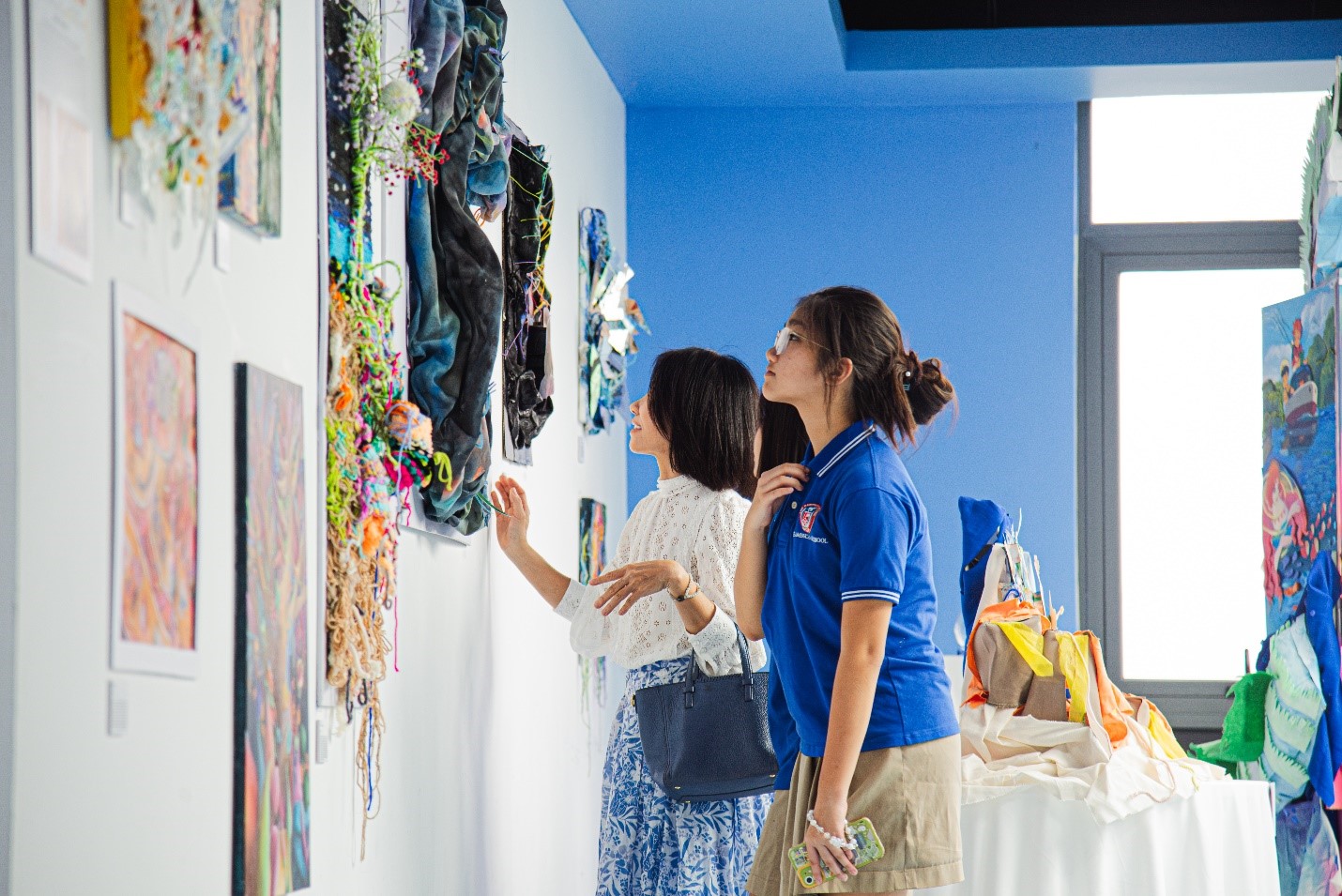
|
|
Students are encouraged to show follow their dreams and hobbies like painting, dancing or singing... Photo courtesy of TAS |
Multiple pathways to success
Harvard professor Howard Gardner demonstrated that intelligence is not limited to IQ or logical-mathematical abilities. Children can thrive in many areas - arts, sports, social interaction, spatial reasoning, and more. TAS embraces this belief by fostering a human-centered learning environment that empowers each student to unlock their full potential.
One example is Nick Q. Tran, also known as Tran Quang Duc, a 2015 TAS graduate and now one of Vietnam's top sports KOLs. "Sports have always been a part of my life, and it started at TAS," he said. "I trained on the school courts, was selected for the national basketball team, and today, football is my full-time career. TAS gave me the discipline and passion to pursue sports professionally, just like any core subject like math or science."
The American School's 25,000-square-meter campus in central District 2 includes 100 modern classrooms, a 35,000-book library, high-tech science labs, a professional auditorium, and a full-scale sports complex with two soccer fields, two basketball courts, two swimming pools, a gym, and a boxing studio. Programs in arts, STEAM, sports, and soft skills are thoughtfully designed to support students' cognitive, physical, emotional, and creative development.
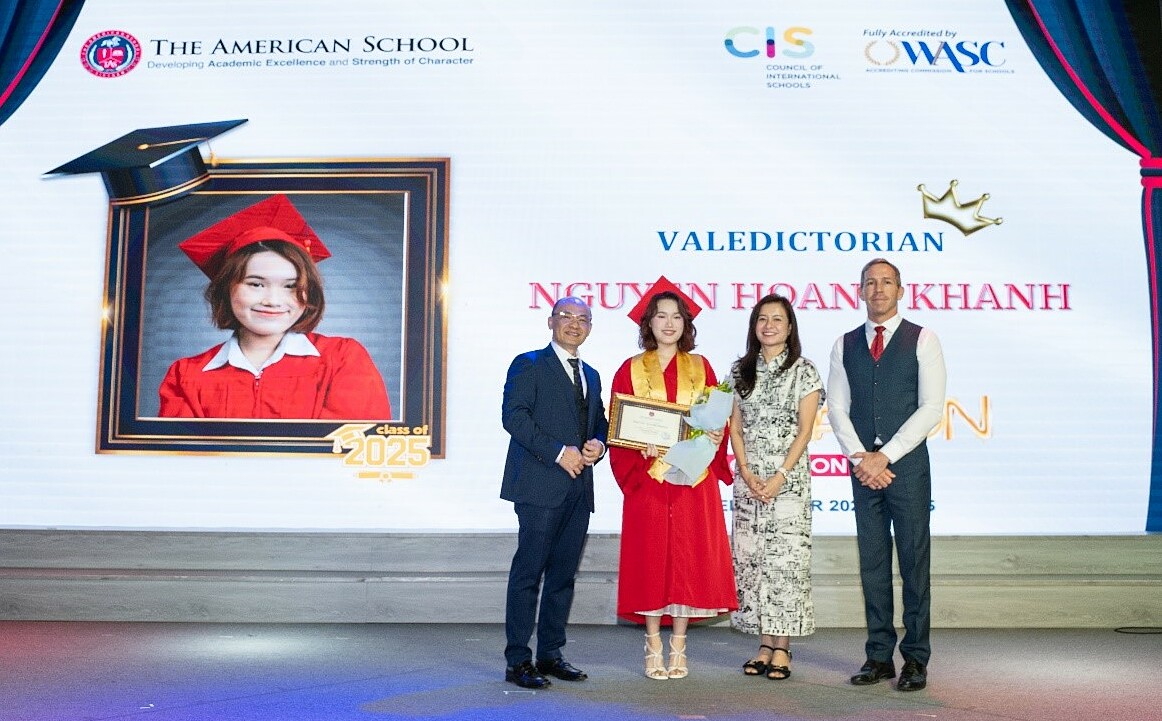
|
|
Van Xuan Thien (L), CEO and educator of TAS, actively participates in student activities. Photo courtesy of TAS |
Leadership and collaboration
Under the leadership of new CEO Van Xuan Thien, TAS has undergone significant upgrades, from campus improvements and curriculum modernization to attracting world-class educators and academic experts. "Our vision is to make TAS one of the leading American-standard international schools in Vietnam, where students are inspired to learn, empowered to grow, and prepared to become global citizens," said Thien.
At The American School, education is a partnership between the school and families. Parents are viewed as essential contributors to each child's success. The school encourages open communication and trust within its diverse, multicultural community.
TAS not only offers a world-class education but also provides a financially competitive option. Tuition fees are roughly two-thirds that of other international schools in Ho Chi Minh City. The school is currently offering tuition discounts of up to VND100 million (US$3,832) for the first 25 new students enrolling for the 2025–2026 academic year.
